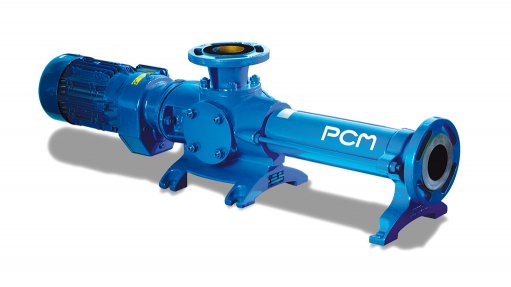
COST SAVINGS Positive displacement pumps offer efficiency at a low life cost
Global progressing cavity pumps manufacturer for the oil and gas industrial sectors PCM Pumps has highlighted the benefits of positive displacement pumps, as the overall efficiency and life cycle of pumps are becoming paramount in the procurement process.
PCM’s progressive and peristaltic pumps are extensively used in various applications in the mining industry. These pumps are designed to transfer abrasive fluids such as mineral pulps or tailings.
The pumps’ performance and efficiency are not affected by variations of viscosity, high solids content or pressure of typical dewatering or filter-press feeding applications.
Another key differentiating factor in positive displacement pumps is that they have a low internal velocity and, thus, there is no significant pressure on the pumps’ internal components.
PCM pumps also do not need seal gland water, which is used to lubricate the packing to the shaft and keep slurry out, and require lower installed power to operate. This translates into significant cost savings and makes these pumps ideal for metering fragile flocculants or when suction lift is needed.
Pump Monitoring
To improve processes’ reliability and regulate cost of ownership, PCM pumps use variable- speed drives, as well as relevant pump and process protection sensors. Pump performance optimisation is achieved through constant monitoring to ensure low-energy consumption and efficiency while early detection of unusual operating conditions assists in eliminating unplanned downtime.
The company says its PCM pumps are designed for easy operation and adaptability to process demands and offer efficiency at a low life cost.
About Progressive Cavity Pumps
A progressive cavity pump is a type of positive displacement pump that transfers fluid by means of discrete cavities, as the pump’s rotor is turned.
Other specific designs involve the rotor of the pump being made of steel, which is coated with a smooth hard surface, normally chromium, with the body made of a moulded elastomer inside a metal tube body. The elastomer core of the stator forms the required complex cavities prevalent in progressive cavity pumps.
About PCM SA
PCM was founded in 1932 by René Moineau, the inventor of the progressive cavity pump.
The company is divided into four clusters and has more than 20 branches and subsidiaries worldwide, employing about 600 people from 35 different nationalities.